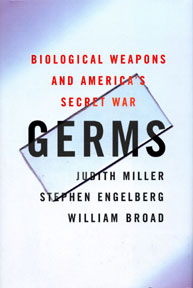Germs: Biological Weapons and America's Secret War
 |
|
| Author | Judith Miller, Stephen Engelberg, William J. Broad |
|---|---|
| Country | United States |
| Language | English |
| Subject | Biological warfare |
| Genre | Nonfiction |
| Publisher | Simon & Schuster |
|
Publication date
|
October 2, 2001 |
| Media type | Hardcover |
| Pages | 382 |
| ISBN | |
| OCLC | 47182085 |
| 358/.38/0973 21 | |
| LC Class | UG447.8 .M54 2001 |
Germs: Biological Weapons and America's Secret War (2001) is a Simon & Schuster-published book describing biological weapons, how humanity has dealt with them, and our present capabilities of handling bioterrorism. It was written by The New York Times journalists Judith Miller, Stephen Engelberg, and William Broad and was the 2001 New York Times #1 Non-Fiction Bestseller the weeks of October 28 and November 4.
The nonfiction book, Germs, is a work of investigative journalism using biography and historical narratives to present issues. The three authors' research is extensive, relying upon hundreds of interviews with scientists and senior U.S. officials, reviews of recently declassified documents, and reports from the former Soviet Union's bioweapons laboratories.
The book begins by recounting the 1984 salmonella poisoning in The Dalles, Oregon, caused by the followers of Bhagwan Shree Rajneesh spraying salmonella onto salad bars. There are several revelations, including how Moscow's scientists created an untraceable germ that could instruct the body to self destroy, and U.S. military plans of germ weaponry attacking Cuba in the 1960s. There are descriptions of three classified U.S. biodefence projects: Project Bacchus, Project Clear Vision, and Project Jefferson.Germs ends with a review of the United States's ability to deter future bio-attack.
...
Wikipedia
